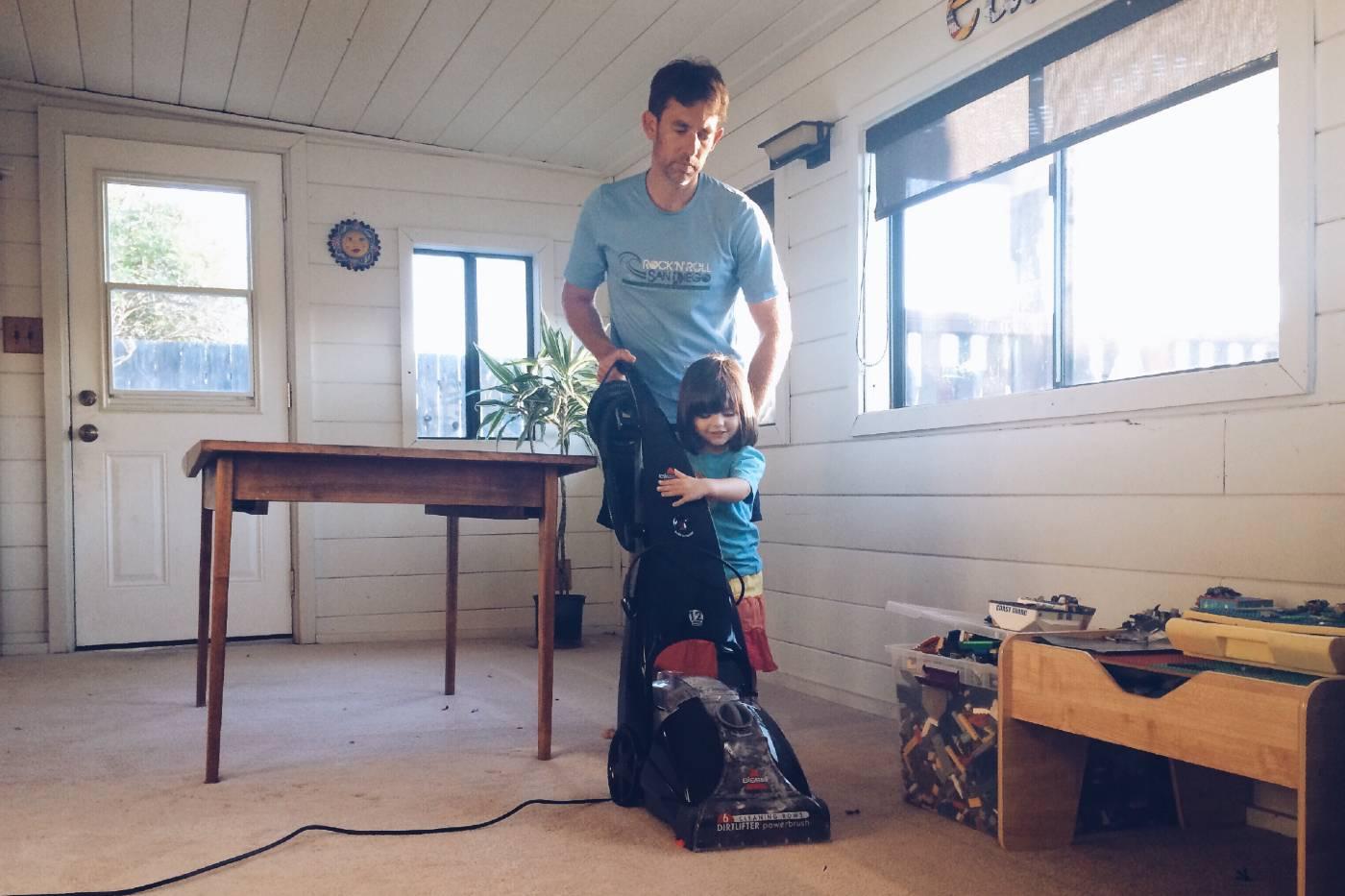TODDLER
How to Teach Work Ethic to Your Toddler
Plant the seeds of good character young! Here are 5 easy work ethic lessons even toddlers benefit from!

Written by
Happiest Baby Staff

Your toddler is years and years away from landing their first job, so is now really the age to start teaching them about the importance of having a strong work ethic? YES! This is actually the perfect time to begin planting the seeds of good character, including the principles of hard work. After all, work ethic isn’t reserved for the 9-to-5. It comes into play all over childhood, like when your tyke is cleaning up their toys or building the best sandcastle ever. Not sure where to start? We lay out some easy ways to get the ball rolling.
Start chores now.
No, we’re not talking about shoveling the driveway or taking the recycling to the curb...not yet, anyway! Instead, create age-appropriate opportunities where your toddler can lend a hand. It’s so much easier to establish good habits when your kiddo is young than attempting to shoehorn them in when they're older. The key is to choose chores they can easily do. (Done with a picture book? Back to the shelf it goes! Finished with the choo-choos? Stow them in the bins under the train table. Dirty clothes? Toss them in the hamper.) Establishing tasks that toddlers can accomplish on their own cultivates a sense of independence, responsibility, and self-esteem—all of which feeds good character and work ethic. Plus, the more your child knows you believe in them, the more they’ll believe in themselves! But don’t forget to share why all these tasks need to be done. (Putting your clothes in the hamper makes sure that they’ll be clean for you to wear them again!) When your tot understands the purpose of the task, they’re more apt to want to do it!
Work together.
It’s true that toddlers are very into the whole I-do-it-myself thing...but they’re also super into teamwork! Take advantage! In the end, part of having a strong work ethic is understanding the value of cooperation. So instead of saying, Put those cars in the toy box, sit down with your kiddo and tackle the task together, perhaps making a game out of the clean-up. (Race you: I’ll get all the blue cars; you get the green ones!) This helps keep a wiggly, distractible toddler on task and shows that work can be fun. In addition, when you express interest in what your toddler is doing, you make them feel great, boosting their self-confidence. The cherry on top: A 2020 study in the journal Social Development, found that the more caregivers modeled prosocial behavior (i.e.: Let’s clean up together!) at 18 months, the more their toddlers helped out at 21 months.
Praise this way…
When it comes to fostering work ethic and cooperation, heaping over-the-top praise onto your toddler (You’re my best helper ever!) is markedly less effective than doling out praise for the action you want to encourage (Thanks so much for putting your socks in the laundry. That was really helpful!). The reason: You’re my best helper ever! may be true one day, but not quite true the next, when your stubborn tot refuses to pick up their dirty clothes. On the other hand, Thanks so much for putting your socks in the laundry. That helps make it easy for us to play in your room! will always be 100% true... and it highlights exactly the behavior you want. It’s also super important to praise your child’s good tries. This will encourage your kiddo to keep at it, even if at first they didn’t succeed...and isn’t that what having a good work ethic is all about!
Be the worker you want your kiddo to be.
You’ll be most successful teaching your child a solid work ethic when you model it yourself. Remember: Your toddler wants to imitate you...you’re super-smart and, yes, even cool in your toddler’s eyes (unfortunately, that probably won’t be true once they hit the tween and teen years) !
But don’t confuse “working hard” with late nights at the office and having your boss on speed dial. The work ethic you want to teach your child is all about staying on task, doing the best work you can, and being proud of your achievements. So, go ahead and talk to your tyke about what you do (at home or at a paying job), including the challenges, how you overcome them, and the reward of doing a good job. Think along the lines of: It was tricky, but I stuck to it and finally figured out how to fit the drippy faucet! or I’m so happy I didn’t give up on my project at work. Mommy won an award for it today! You’ve got good reason to: Research in the journal Human Relations found that folks are way more prone to consider hard work as normal if they grew up watching their parents work hard.
Let your tot struggle...some.
It’s hard! We know! You don’t want to see your sweet toddler sweat, get frustrated, and fizzle out. But try thinking about it this way: You can't teach your child about the art of perseverance if you swoop in and kick down all their obstacles.
Say your tot is building a super-tall block tower and—boom!—it hits the floor. Tears fall. Resist your urge to say, “It’s okay!” or “I’ll fix it!” Doing so can actually send the message that your toddler’s upset feelings aren’t valid, and you don’t think they’re capable of building the tower. (Yikes.) Instead, help your child recognize and talk about their feelings. This bolsters self-awareness, which is key to a child’s budding work ethic. (I see you’re upset! I bet you’re so disappointed that your tower fell!) Only after you acknowledge and chat about your kiddo’s feelings should you help find a solution. The key word here being help. Don’t just start building an awe-inspiring and structurally sound skyscraper! Rather, throw out some ideas and ask your child to offer solutions, too. Do you think we should try a different size block on the bottom? Maybe we should build on the table, instead of the rug? Again, this’ll hit home determination, teamwork, and pride in one’s work.
For more helpful tips about how to strengthen your toddler’s character, check out “Happiest Toddler on the Block."
Disclaimer: The information on our site is NOT medical advice for any specific person or condition. It is only meant as general information. If you have any medical questions and concerns about your child or yourself, please contact your health provider.
SHARE THIS ARTICLE
MOST LOVED
Sleepytime Sidekicks












